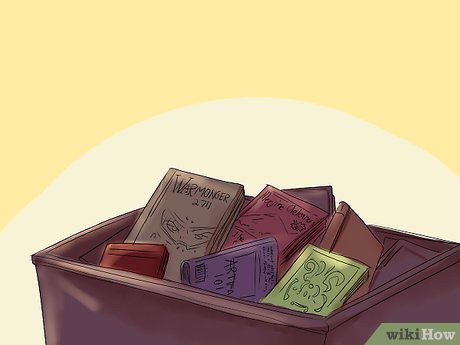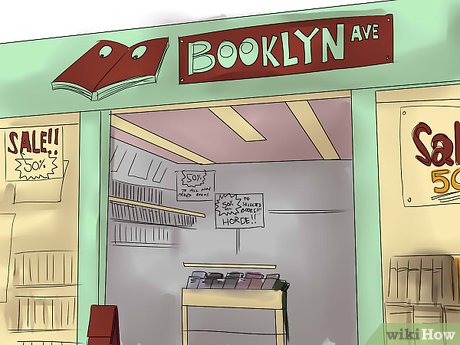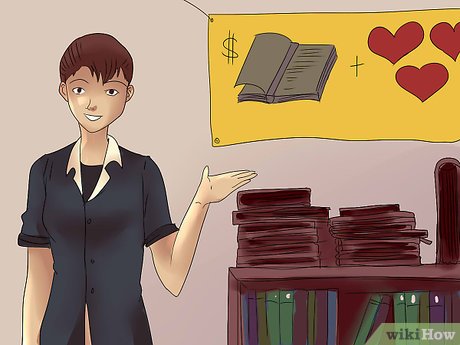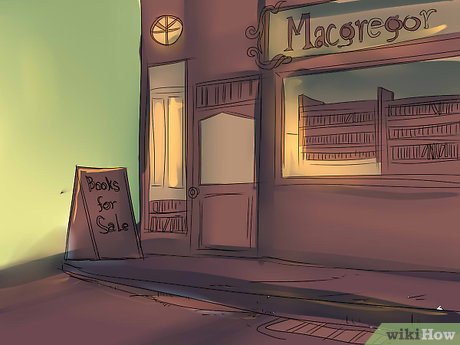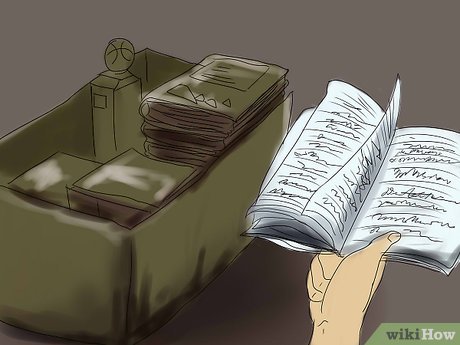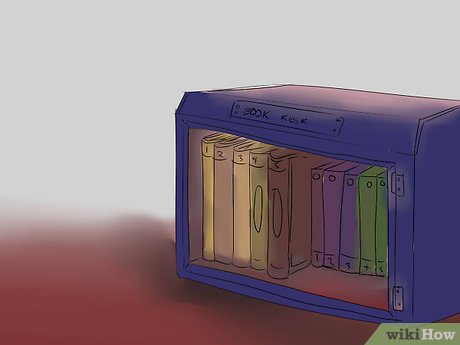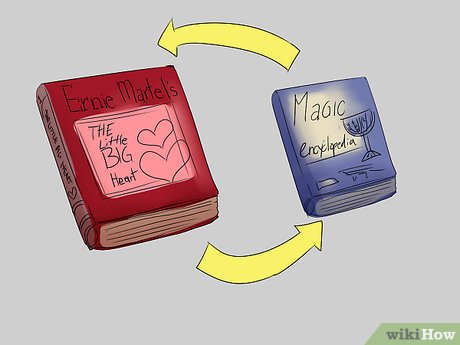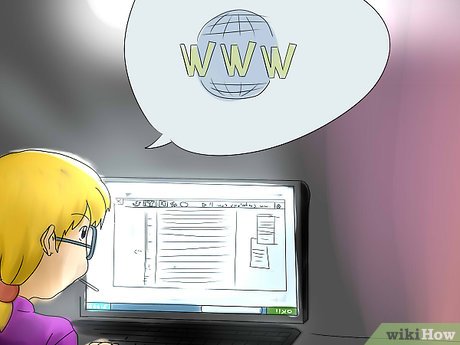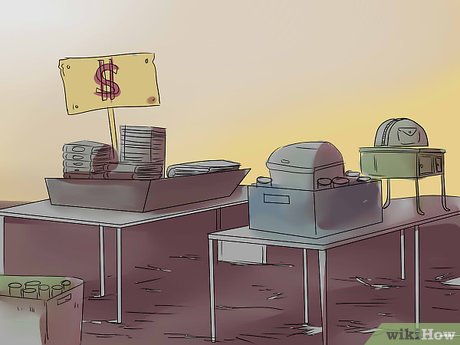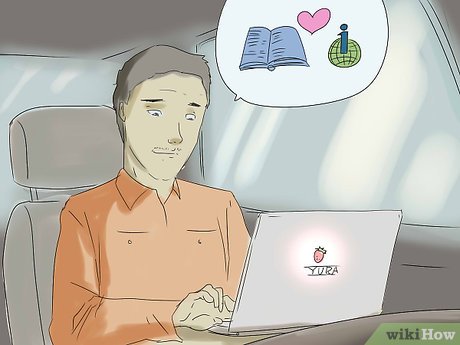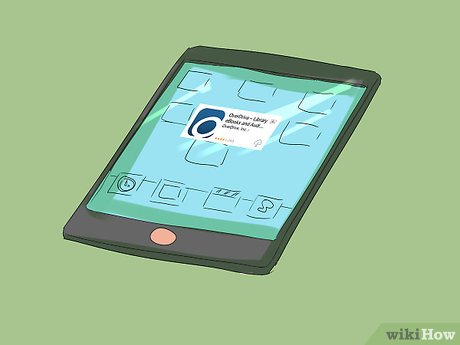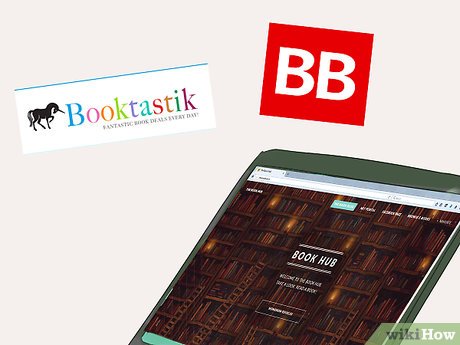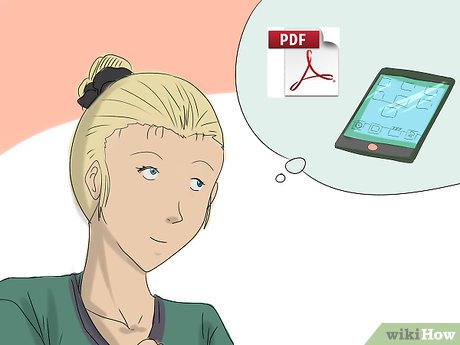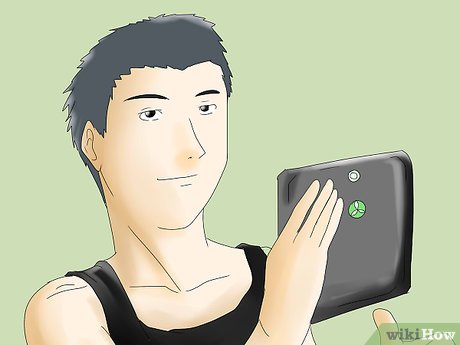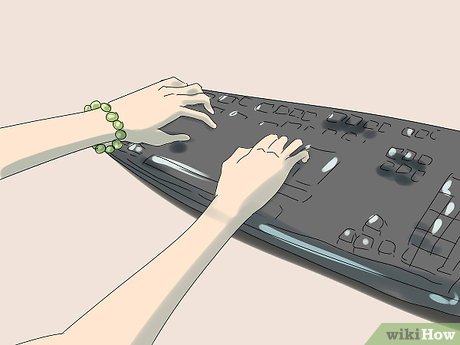How to Be a Bookworm on a Budget
Method 1 of 3:
Finding Physical Books
-
 Visit the library. If you live in a city, the library is a great source of books on loan. If you'll only read the book once, or you're not sure whether you'll enjoy it, always check the local library catalogue.
Visit the library. If you live in a city, the library is a great source of books on loan. If you'll only read the book once, or you're not sure whether you'll enjoy it, always check the local library catalogue. -
 Look for library book sales.[1] Many local libraries hold occasional book sales to clear out "deacquisitioned" books they've decided to remove from the shelf. These books are usually sold cheap (US $1–$5), and are usually kept in very good condition compared to other used books.[2]
Look for library book sales.[1] Many local libraries hold occasional book sales to clear out "deacquisitioned" books they've decided to remove from the shelf. These books are usually sold cheap (US $1–$5), and are usually kept in very good condition compared to other used books.[2] -
 Check second hand stores. Depending on the store and region, second hand stores and pawn shops may sell a wide variety of books under $10. Always flick through the books to check for damage first, as condition varies greatly.
Check second hand stores. Depending on the store and region, second hand stores and pawn shops may sell a wide variety of books under $10. Always flick through the books to check for damage first, as condition varies greatly. -
 Consider charity retail stores. Also called opportunity shops or "op shops," the selection and quality is similar to second hand stores. The books tend to be slightly more expensive, and prices are less negotiable, since the goal is charity fundraising.
Consider charity retail stores. Also called opportunity shops or "op shops," the selection and quality is similar to second hand stores. The books tend to be slightly more expensive, and prices are less negotiable, since the goal is charity fundraising.- Some hospital gift shops have a similar section to benefit the hospital.
-
 Visit independent bookstores for a large selection. Books sold here tend to be in the best condition, but are more expensive than other options. Your best bet is stores that sell publisher overstock and other bargain books, although these tend to flood with non-fiction rather than bestsellers. Check the store's website for upcoming sales and discounts.
Visit independent bookstores for a large selection. Books sold here tend to be in the best condition, but are more expensive than other options. Your best bet is stores that sell publisher overstock and other bargain books, although these tend to flood with non-fiction rather than bestsellers. Check the store's website for upcoming sales and discounts.- Antiquarian bookstores are great for finding unexpected treasures and books on old-fashioned topics, often for low prices. And what bookworm doesn't enjoy wandering around a hoard of books older than he is?
-
 Browse through warehouse clearances. You can find great deals here, depending on the store. However, 99% of the books sold here are unsorted. If you don't mind hours of searching through boxes, keep an eye out for these sales.
Browse through warehouse clearances. You can find great deals here, depending on the store. However, 99% of the books sold here are unsorted. If you don't mind hours of searching through boxes, keep an eye out for these sales. -
 Learn about book kiosks. "Take a book, leave a book" boxes have been cropping up in many regions the last few years. If you don't see any in your neighborhood, consider setting one up in front of your home. In good weather, this is as simple as putting out an old bookcase stocked with old books, and a paper sign with instructions. This can be a great way to meet neighbors and start a little community as well.
Learn about book kiosks. "Take a book, leave a book" boxes have been cropping up in many regions the last few years. If you don't see any in your neighborhood, consider setting one up in front of your home. In good weather, this is as simple as putting out an old bookcase stocked with old books, and a paper sign with instructions. This can be a great way to meet neighbors and start a little community as well.- If you don't have a yard, ask your landlord if you can put a bookcase in the lobby. Public or semi-public places such as libraries, college campuses, or churches are another possible opportunity. If possible, have the hosting organization advertise it on its website.
- For more information, look up the Little Free Library project.
-
 Share books with friends and family. If you know other people who share your reading tastes, don't waste money buying multiple copies of the same books. Lend each other reading material instead, and/or agree to split the price of new purchases between you.[3]
Share books with friends and family. If you know other people who share your reading tastes, don't waste money buying multiple copies of the same books. Lend each other reading material instead, and/or agree to split the price of new purchases between you.[3] -
 Organize a book swap. You can arrange this event at a community center, school, or even just among a large group of friends. Each person drops off books they no longer want, and receives an equal number of tickets. You can then browse the books and talk to other attendees, then trade in each ticket for any one book.
Organize a book swap. You can arrange this event at a community center, school, or even just among a large group of friends. Each person drops off books they no longer want, and receives an equal number of tickets. You can then browse the books and talk to other attendees, then trade in each ticket for any one book.- There are also online book swap sites such as BookMooch.
-
 Order from used book sites. Thrift Books, Amazon's AbeBooks, and similar sites offer many used books, often for less than US $2. The cheapest ones are often dog-eared, frayed, or heavily marked, but they are rarely unreadable.[4]
Order from used book sites. Thrift Books, Amazon's AbeBooks, and similar sites offer many used books, often for less than US $2. The cheapest ones are often dog-eared, frayed, or heavily marked, but they are rarely unreadable.[4]- Keep in mind that it's difficult to judge a book based on the cover image. Don't spend too much money on an unknown book unless you're confident in the site's return policy.
-
 Try flea markets and garage sales as last resorts. Unless you can find a specific book market, these locations usually have relatively few books. Keep an eye out if you're also looking for other cheap goods, but don't expect great results.
Try flea markets and garage sales as last resorts. Unless you can find a specific book market, these locations usually have relatively few books. Keep an eye out if you're also looking for other cheap goods, but don't expect great results.- The main advantage to these locales is the negotiable prices. Most sellers expect to haggle.
Method 2 of 3:
Getting Digital Books
-
 Read free books in a web browser. You can find many free books to download or read in your web browser. For self-published works (mostly fiction), try rednovels.com, BookRix, Wattpad, Smashwords, or forum.ucweb.com. Find classic books on gutenberg.org, or "check out" copyrighted works from the Internet Archive's Open Library.
Read free books in a web browser. You can find many free books to download or read in your web browser. For self-published works (mostly fiction), try rednovels.com, BookRix, Wattpad, Smashwords, or forum.ucweb.com. Find classic books on gutenberg.org, or "check out" copyrighted works from the Internet Archive's Open Library.- Gutenberg only hosts books that are legal to download in the United States. A few related projects such as gutenberg.ca (for Canada) provide works focused on other countries (in both cultural and copyright terms).
- You'll need (free) Adobe E-reader software or a similar alternative to read some books.
-
 Connect to your local library on your phone. The Overdrive app for iOS and Android lets you "check out" items from your library's digital collections.[5] As long as you have a library account, this can be a great free source of audiobooks and video as well as eBooks.[6]
Connect to your local library on your phone. The Overdrive app for iOS and Android lets you "check out" items from your library's digital collections.[5] As long as you have a library account, this can be a great free source of audiobooks and video as well as eBooks.[6] -
 Look for limited time offers. Check eBook stores regularly for limited time deals. If you are a frequent purchaser, explore websites that collect deals and cheap books for you to browse, such as BookBub, Pauper's Book Club, Booktastik, or BookHub.[7]
Look for limited time offers. Check eBook stores regularly for limited time deals. If you are a frequent purchaser, explore websites that collect deals and cheap books for you to browse, such as BookBub, Pauper's Book Club, Booktastik, or BookHub.[7] -
 Search for pdf versions of books you can't afford. Some publishers sell digital copies much cheaper than the physical version. Legal free copies are sometimes available as well, if the copyright has expired.[8]
Search for pdf versions of books you can't afford. Some publishers sell digital copies much cheaper than the physical version. Legal free copies are sometimes available as well, if the copyright has expired.[8]- Warning: if the book is still under copyright, most free online pdfs are illegal to download. Copyright laws vary by country.
-
 Consider an e-reader. Although it takes some initial investment, an e-reader can be cost-effective in the long run. Some e-readers offer a subscription service, where you pay a certain amount each month to gain access to hundreds of titles. If you're an eBook fan, this could rapidly make up for the initial cost.[9]
Consider an e-reader. Although it takes some initial investment, an e-reader can be cost-effective in the long run. Some e-readers offer a subscription service, where you pay a certain amount each month to gain access to hundreds of titles. If you're an eBook fan, this could rapidly make up for the initial cost.[9]- You can often find used e-readers for under $30 online.
- Paying for an Amazon Prime account may get you access to one free eBook each month.
Method 3 of 3:
Using Creative Solutions
-
 Contact the author. If you are having trouble finding a specific work, try searching online for the author's email or snail mail address. Many authors are delighted to hear from readers, and may send you a free or discount copy. This is especially true for lesser-known authors, or authors with specialized audiences.
Contact the author. If you are having trouble finding a specific work, try searching online for the author's email or snail mail address. Many authors are delighted to hear from readers, and may send you a free or discount copy. This is especially true for lesser-known authors, or authors with specialized audiences. -
 Review books online. Some publishers offer discounts or review copies to people in exchange for a review. Your best bet is to start a blog or similar platform that allows you to reach a moderately large audience.
Review books online. Some publishers offer discounts or review copies to people in exchange for a review. Your best bet is to start a blog or similar platform that allows you to reach a moderately large audience. -
 Befriend an independent bookstore owner. If you spend all your free time in bookstores, get to know the people behind the counter. You may get freebies and discounts, or just the privilege of reading in the store without a purchase.
Befriend an independent bookstore owner. If you spend all your free time in bookstores, get to know the people behind the counter. You may get freebies and discounts, or just the privilege of reading in the store without a purchase.- You may even be able to work part-time to earn a sizable employee's discount.
-
 Clear out attics and garages. Volunteer to help relatives or neighbors clean out their storage spaces in exchange for unwanted books.
Clear out attics and garages. Volunteer to help relatives or neighbors clean out their storage spaces in exchange for unwanted books. -
 Start writing your own material. If the writing bug catches you, you'll be spending many hours with the written word! For motivation and even more reading material, challenge your friends to writing projects and share your works with each other.
Start writing your own material. If the writing bug catches you, you'll be spending many hours with the written word! For motivation and even more reading material, challenge your friends to writing projects and share your works with each other.
Share by
David Pac
Update 24 March 2020

